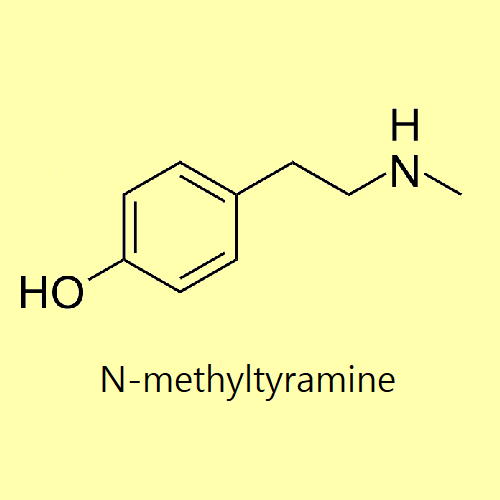Monographs licensed from Therapeutic Research Center, LLC
Scientific names: N-methyltyramine
Alternate names: 4-Hydroxy-N-methylphenethylamine, Methyl-4-tyramine, N-Methyl L-tyramine, N-Methyl Tyramine, N-Methyl-tyramine, N-Methyltyramine Hydrochloride, NMT, p-(2-Methylamino)ethyl)phenol, p-(2-Methylaminoethyl)-phenol, p-(2-Methylaminoethyl)phenol
Actions: General, Gastrointestinal, Weight loss
Scientific names: N-methyltyramine
Alternate names: 4-Hydroxy-N-methylphenethylamine, Methyl-4-tyramine, N-Methyl L-tyramine, N-Methyl Tyramine, N-Methyl-tyramine, N-Methyltyramine Hydrochloride, NMT, p-(2-Methylamino)ethyl)phenol, p-(2-Methylaminoethyl)-phenol, p-(2-Methylaminoethyl)phenol
Actions: General, Gastrointestinal, Weight loss
N-methyltyramine is a chemical that is found in bitter orange and other plants, and in the human body in small amounts. It is also made in the lab. N-methyltyramine is banned by the World Anti-Doping Agency (WADA) for use during competitive sports. N-methyltyramine is found in some dietary supplements. However, the US Food and Drug Administration (FDA) cautions against its use and is investigating whether N-methyltyramine should be allowed in dietary supplements.
N-methyltyramine is commonly used for weight loss and athletic performance, but there is no good scientific evidence to support these uses.
When taken by mouth: There isn't enough reliable information to know if N-methyltyramine is safe or what the side effects might be.
Special Precautions & Warnings:
Pregnancy and breast-feeding: There isn't enough reliable information to know if N-methyltyramine is safe to use when pregnant or breast-feeding. Stay on the safe side and avoid use.
High blood pressure: N-methyltyramine might increase blood pressure. In theory, taking N-methyltyramine might make high blood pressure worse.
Surgery: N-methyltyramine might increase blood pressure. In theory, taking N-methyltyramine might interfere with surgery by increasing blood pressure. Stop taking N-methyltyramine at least 2 weeks before surgery.
NatMed Pro rates effectiveness based on scientific evidence according to the following scale: Effective, Likely Effective, Possibly Effective, Possibly Ineffective, Likely Ineffective, Ineffective, and Insufficient Evidence to Rate.
- Athletic performance.
- Weight loss.
- Improved focus.
- Other uses.
More evidence is needed to rate the effectiveness of N-methyltyramine for these uses.
The appropriate dose of N-methyltyramine depends on several factors such as the user's age, health, and several other conditions. At this time there is not enough scientific information to determine an appropriate range of doses for N-methyltyramine. Keep in mind that natural products are not always necessarily safe and dosages can be important. Be sure to follow relevant directions on product labels and consult your pharmacist or physician or other healthcare professional before using.
Interactions with pharmaceuticals
Medications for high blood pressure (Antihypertensive drugs)
Interaction Rating=Minor Be watchful with this combination.
N-methyltyramine might increase blood pressure. Taking N-methyltyramine along with medications for high blood pressure might reduce the effects of these medications.
Some medications for high blood pressure include captopril (Capoten), enalapril (Vasotec), losartan (Cozaar), valsartan (Diovan), diltiazem (Cardizem), Amlodipine (Norvasc), hydrochlorothiazide (HydroDiuril), furosemide (Lasix), and many others.
Stimulant drugs
Interaction Rating=Minor Be watchful with this combination.
Stimulant drugs speed up the nervous system and can cause a jittery feeling and a rapid heartbeat. N-methyltyramine might also speed up the nervous system. Taking N-methyltyramine along with stimulant drugs might cause serious problems including high blood pressure.
Some stimulant drugs include diethylpropion (Tenuate), epinephrine, phentermine (Ionamin), pseudoephedrine (Sudafed), and many others.
Interactions with herbs & supplements
Herbs and supplements with stimulant properties: Stimulant herbs and supplements speed up the nervous system and can cause a jittery feeling and a rapid heartbeat. N-methyltyramine might also speed up the nervous system. Taking N-methyltyramine along with stimulant herbs and supplements might cause serious problems including high blood pressure. Herbs and supplements with stimulant properties include ephedra, caffeine, and caffeine-containing supplements such as coffee, cola nut, guarana, and mate.
There are no known interactions with foods.
N-methyltyramine is most often used for weight loss. Scientists have found that chemicals that are similar to N-methyltyramine help to break down fat in fat cells. However, N-methyltyramine doesn't seem to break down fat. In fact, it might increase appetite and slow down the breakdown of fat in fat cells.
vital.ly has licensed monographs from TRC Healthcare.
This monograph was last reviewed on 31/07/2023 10:00:00. Monographs are reviewed and/or updated multiple times per month and at least once per year.
Natural Medicines disclaims any responsibility related to medical consequences of using any medical product. Effort is made to ensure that the information contained in this monograph is accurate at the time it was published. Consumers and medical professionals who consult this monograph are cautioned that any medical or product related decision is the sole responsibility of the consumer and/or the health care professional. A legal License Agreement sets limitations on downloading, storing, or printing content from this Database. No reproduction of this monograph or any content from this Database is permitted without written permission from the publisher. It is unlawful to download, store, or distribute content from this site.
Natural Medicines rates safety based on scientific evidence according to the following scale: Likely Safe, Possibly Safe, Possibly Unsafe, Likely Unsafe, Unsafe, and Insufficient Evidence to Rate. For more information about Natural Medicines’ Safety Rating System,
click here.
The Natural Medicines Effectiveness Ratings are assigned for specific indications. A product might be rated "Possibly Effective" for one condition, but be rated "Likely Ineffective" for another condition, depending on the evidence. For more info
click here.





